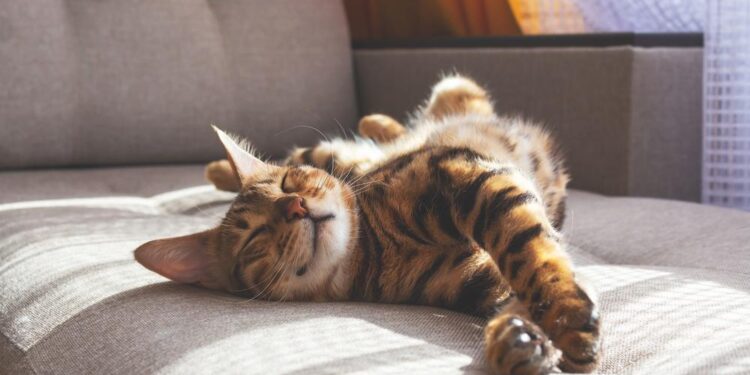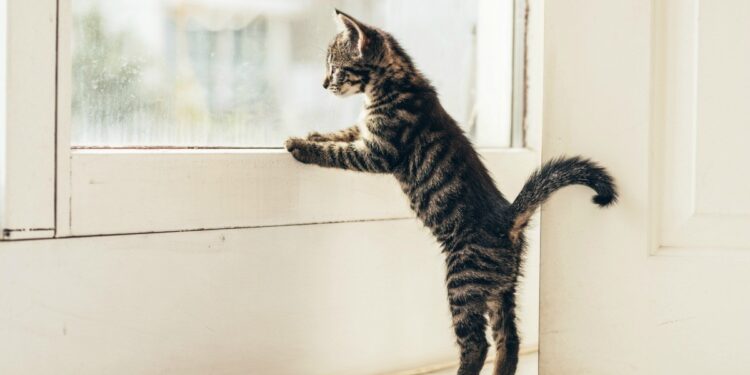There are many pet parents who adopted their cats from a shelter and saved them from a life of being a permanently outdoor cat. They’ve been well-protected indoors for many years, but as a pet parent, you might wonder if you should let your indoor cat roam outside from time to time. For example, indoor cats may enjoy the benefits of a cozy carpet and more frequent snuggling and grooming sessions with their pet parent, while outdoor cats have a wider opportunity to socialize with other cats and humans. The debate about keeping a cat indoors or outdoors has certainly sparked some passionate discussions, so we’ll take a look at the pros and cons of both.

Indoor vs. Outdoor Cat Safety
Keeping a cat indoors will tend to keep them safe from diseases they can catch from the outside. According to Dutch, the online vet care company, there are health and safety concerns to keep in mind if you’re keeping your cat outdoors. The risk of contracting diseases like feline leukemia, feline immunodeficiency and other upper respiratory diseases increases. They’ll also be safer from outdoor hazards like predators and traffic.
Tracking an Indoor vs. Outdoor Cat
If you live in an urban area, keep in mind that an outdoor cat can be harder to keep track of. Even if you have a microchip in your cat to track them, you don’t want to rely on that to keep track of where your cat is at all times. You’ll have to weigh the pros and cons, but if you do decide to keep your cat outdoors, make sure you have regular grooming sessions with your cat to check for injuries, ticks, and any other potential health concerns.
Socializing Your Cat
While it seems that keeping a cat indoors is more beneficial for your cat’s health and safety so far, there are pros that come with having an outdoor cat. An outdoor cat will have more opportunities for socialization than cats who stay indoors. Your outdoor cat can interact more with other cats or other animals, but be wary that those other animals they run into can also be predators, and you won’t be able to control what happens to them when left to their own devices. If you do decide to keep your cat indoors, it’ll be especially important to have one-on-one socialization time with your kitty. You can bond with your cat while having a helpful grooming session with them using a portable pet hair remover. This little tool can remove fur from their coat, and you can use it as an excuse to snuggle with your cat!

Cat Exploration Opportunities
Let’s face it — when your indoor cat is stuck inside all day, it might actually feel like a bit of a recluse. While we consider cats to be independent pets that are quite adept at entertaining themselves, they need exploration and stimulation. Allowing your cat to be outdoors can help them fulfill their natural instincts and provide them with mental stimulation.
Cat Health and Safety
According to Thinking Outside the Cage, the average lifespan for an indoor cat ranges between 10 to 20 years, while an outdoor cat tends to live only two to five years. Cats who live outdoors or who are allowed to roam outdoors from time to time do face huge safety and health risks.
Cat Exercise
Allowing your cat to spend time outdoors will give them a chance to have more physical activity. Indoor cats can still exercise, but they’ll require more interactive play and toys to stay in shape.
Cat Allergies
An indoor cat is beneficial for anyone who suffers from allergies or asthma since they are cleaner overall and tends to produce fewer allergens. To help reduce allergens in your home for both you and your cat, routinely groom your cat with a cat hair removal tool. This tool can remove excess fur from your cat and can also be used to remove hair from other places at home, like carpet, furniture, and clothing. Plus, with this tool, you can practice regular grooming, which will help your cat maintain a healthy coat and reduce the risk of potential skin issues.

Potential Environmental Impact
Outside of what is or isn’t safe for your cat, you may also want to think about the potential environmental impact your cat could have if they are an outdoor cat. Cats can affect the local wildlife by hunting birds and other small animals, while indoor cats aren’t able to go hunting for food or fun unless you count the occasional mouse or cockroach at home.
While the debate on letting your cat stay inside or not rages on, it’s ultimately a decision up to you as their pet parent and your cat, depending on how they respond to either option. Regardless of whether you decide to keep your cat indoors or outdoors, ensure you maintain their health with regular grooming, a necessary routine for both indoor and outdoor cats. Regular grooming with a deshedder will prevent matting, and hairballs and reduce shedding and allergies to keep you and your feline friend healthy and comfortable.
Read Also: Golden British Shorthair




